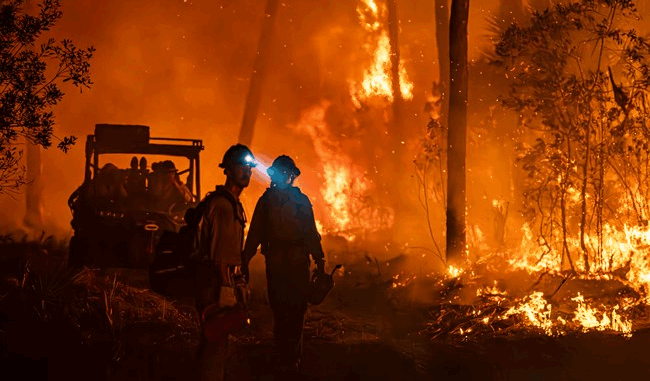
In a landscape filled with procedural dramas and firefighter heroics, Fire Country stands out for its willingness to wade into morally gray territory. Nowhere is that clearer than in its depiction of inmate firefighter programs—a real-world initiative in California where prisoners battle wildfires in exchange for reduced sentences and minimal pay.
While the series delivers high-stakes rescues and adrenaline-pumping action, it also poses a deeper question: At what cost does redemption come, and who decides who’s worthy of it?
Through characters like Bode Donovan and the broader inmate crew, Fire Country explores the uneasy intersection of punishment and purpose, labor and exploitation, hope and survival.
Fact Meets Fiction: The Reality Behind the Flames
Inmate firefighter camps are not fictional. For decades, California has employed incarcerated individuals to assist Cal Fire in containing wildfires. These inmates undergo training, live in fire camps, and risk their lives on the front lines—often earning just a few dollars a day.
The program has sparked national debate: Is it an opportunity for rehabilitation, or a form of exploitative labor?
Fire Country doesn’t offer a simplistic answer. Instead, it dramatizes the tension from both sides. It shows how dignity and danger co-exist for these inmates—how the fire line is both a battlefield and a crucible for transformation.
Bode Donovan: The Face of Complicated Redemption
At the center of this conflict is Bode Donovan, a former firefighter turned inmate. His assignment to Three Rock Camp becomes more than just community service—it becomes a second chance to reclaim his name, his future, and his family.
But Bode’s journey is anything but easy. He’s constantly reminded that his past mistakes define him, even as he risks his life to protect others. The fire doesn’t care if he’s a convict or a hero—and that’s precisely the point.
Bode’s character embodies the contradictions of the system. He’s skilled, brave, and committed—yet he’s still shackled by public perception and institutional rules. His struggle isn’t just against the flames—it’s against a world that resists giving him a fresh start.
The Brotherhood of the Inmate Camp

One of the most compelling aspects of Fire Country is its portrayal of the inmate firefighter unit not as a group of outcasts, but as a brotherhood forged by necessity.
Each member brings his own demons to the crew—addiction, anger, regret. Yet within the structure of the camp, these men form a bond that transcends crime and punishment. They train together, eat together, and risk everything for each other.
The show doesn’t sanitize their pasts, nor does it sensationalize them. Instead, it gives each man a complex emotional arc, emphasizing the human behind the inmate number. It’s not about erasing their crimes—it’s about recognizing their capacity to grow.
Exploitation or Empowerment?
This is the show’s most provocative question: Are these men being used, or are they being offered a genuine path to redemption?
On one hand, the inmates are given real responsibility, and many clearly take pride in their work. They gain skills, confidence, and a sense of purpose. On the other hand, the systemic reality remains troubling: minimal pay, no benefits, limited opportunities to continue firefighting post-incarceration.
Fire Country doesn’t look away from this contradiction. It dramatizes the resentment some inmates feel, the internal politics of who gets promoted or recognized, and the tension between their visible heroism and invisible status in society.
By doing so, the show urges viewers to question how much of our justice system is about rehabilitation—and how much is about optics.
The Public Perception Problem
Even when inmate firefighters prove their bravery, they still face discrimination and suspicion from both the public and their colleagues.
Bode’s presence at Edgewater creates tension. Some locals can’t separate his orange jumpsuit from his character. Even within Cal Fire, not everyone believes inmates should be on the front lines.
This mirrors real-world stigmas where formerly incarcerated individuals face barriers to employment and reintegration, no matter how hard they’ve worked to change.
Through Bode and his crew, Fire Country exposes the hypocrisy of a system that wants redemption stories, but doesn’t always want redeemed people.
Fire as a Great Equalizer
One of the most powerful metaphors in the show is that fire doesn’t discriminate. When flames roar through a forest, it doesn’t matter if the firefighter is an inmate or a captain—what matters is skill, courage, and teamwork.
This idea plays out repeatedly in the series. Inmates save lives. Inmates die in service. Inmates are the last line of defense in a crisis.
The fire becomes both the danger and the equalizer—a place where social labels fall away and what’s left is raw, unfiltered humanity.
Why It Matters
By shining a light on inmate firefighter programs, Fire Country dares to ask difficult, necessary questions. It challenges viewers to reconsider their assumptions about crime, punishment, and the possibility of change.
It forces us to confront a truth many would rather ignore: that redemption isn’t a neat arc—it’s messy, painful, and often overlooked by those in power.
In this way, Fire Country isn’t just a drama about fighting wildfires. It’s a story about fighting for a second chance, and the systems that often stand in the way.
